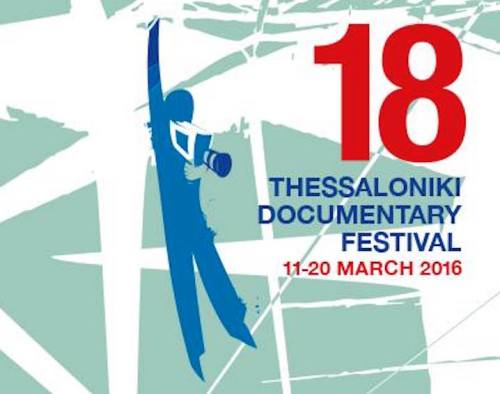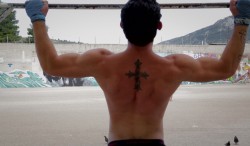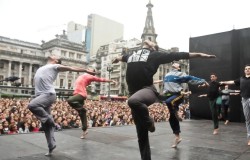 The 18th edition of the Thessaloniki Documentary Festival begins tomorrow, Friday, March 11, and will present approximately 140 new and recent nonfiction features by the time it ends on Sunday, March 20. The following overview offers some highlights in many of the thematic sections of the event:
The 18th edition of the Thessaloniki Documentary Festival begins tomorrow, Friday, March 11, and will present approximately 140 new and recent nonfiction features by the time it ends on Sunday, March 20. The following overview offers some highlights in many of the thematic sections of the event:
 Contemporary issues are the focus of the Views of the World strand, which covers such topics as the rise of neo-Nazism in Greece, in Angélique Kourounis’ GOLDEN DAWN: A PERSONAL AFFAIR; Ebola, in Nico Piro’s KILLA-DIZEZ: LIFE AND DEATH IN THE TIME OF EBOLA (pictured); the impact of the economic crisis on a group of factory workers, in Apostolos Karakasis’ NEXT STOP: UTOPIA; and alternatives to standardized testing-focused education, in Daniel Stilling’s NATUREPLAY.
Contemporary issues are the focus of the Views of the World strand, which covers such topics as the rise of neo-Nazism in Greece, in Angélique Kourounis’ GOLDEN DAWN: A PERSONAL AFFAIR; Ebola, in Nico Piro’s KILLA-DIZEZ: LIFE AND DEATH IN THE TIME OF EBOLA (pictured); the impact of the economic crisis on a group of factory workers, in Apostolos Karakasis’ NEXT STOP: UTOPIA; and alternatives to standardized testing-focused education, in Daniel Stilling’s NATUREPLAY.
 Among other subjects, the Human Rights section looks at a Greek detention center for foreign youths in Menelaos Karamaghiolis’ A SECOND CHANCE (pictured); and at the deleterious effects of the fear of female sexuality in Islam in Güner Yasemin Balci’s THE VIRGIN OBSESSION; while the special thematic section, Refugees: Escape to Freedom?, reflects on the ongoing refugee crisis in films like Morteza Jafari’s DREAMING OF LIFE, which films the journey between Turkey to Greece; Mani Y Benchelah’s THIS IS EXILE: DIARIES OF CHILD REFUGEES, recording testimony from children forced from Syria to Lebanon; and Tim De Keersmaecker’s NO MAN IS AN ISLAND, about the fates of two teenage migrants in Lampedusa.
Among other subjects, the Human Rights section looks at a Greek detention center for foreign youths in Menelaos Karamaghiolis’ A SECOND CHANCE (pictured); and at the deleterious effects of the fear of female sexuality in Islam in Güner Yasemin Balci’s THE VIRGIN OBSESSION; while the special thematic section, Refugees: Escape to Freedom?, reflects on the ongoing refugee crisis in films like Morteza Jafari’s DREAMING OF LIFE, which films the journey between Turkey to Greece; Mani Y Benchelah’s THIS IS EXILE: DIARIES OF CHILD REFUGEES, recording testimony from children forced from Syria to Lebanon; and Tim De Keersmaecker’s NO MAN IS AN ISLAND, about the fates of two teenage migrants in Lampedusa.
 Stories To Tell puts the spotlight on the personal in films like: Arto Halonen’s WHITE RAGE, an intimate exploration of the links between bullying and extreme aggression; Christian Sonderby Jepsen’s NATURAL DISORDER (pictured), a profile of a man with cerebral palsy who questions concepts of normality; Christophe Magdy Saber’s THE VALLEY OF SALT, which follows the filmmaker back to Cairo following the revolution; Maro Anastopoulou’s WHISPERS OF THE SKY, about two men on a remote Greek island who read the signs of nature; Eliana Abravanel’s FINISH LINE, profiling three senior citizen marathon runners; Tania Chatzigeorgiou’s “MORNING NEIGHBOR!”, about a woman who is determined to make a life on her home island; and Jerzy Śladkowski’s DON JUAN, the story of a young autistic Russian man’s quest for love.
Stories To Tell puts the spotlight on the personal in films like: Arto Halonen’s WHITE RAGE, an intimate exploration of the links between bullying and extreme aggression; Christian Sonderby Jepsen’s NATURAL DISORDER (pictured), a profile of a man with cerebral palsy who questions concepts of normality; Christophe Magdy Saber’s THE VALLEY OF SALT, which follows the filmmaker back to Cairo following the revolution; Maro Anastopoulou’s WHISPERS OF THE SKY, about two men on a remote Greek island who read the signs of nature; Eliana Abravanel’s FINISH LINE, profiling three senior citizen marathon runners; Tania Chatzigeorgiou’s “MORNING NEIGHBOR!”, about a woman who is determined to make a life on her home island; and Jerzy Śladkowski’s DON JUAN, the story of a young autistic Russian man’s quest for love.
 Personal stories are also key to Portraits: Human Journeys, which includes: Jonas Poher Rasmussen’s WHAT HE DID, which seeks to understand why a noted author murdered his longtime boyfriend; Belinda Schmid and David Cranstoun Welch’s THE BOOK OF CONRAD (pictured), about an eccentric poet and his travels around the US; Ty Flowers’ TIME SIMPLY PASSES, on the struggles of a wrongly convicted man to receive recompense from the government; and Jobst Knigge’s STALIN’S DAUGHTER, a portrait of the dictator’s offspring and her reckoning with his infamy.
Personal stories are also key to Portraits: Human Journeys, which includes: Jonas Poher Rasmussen’s WHAT HE DID, which seeks to understand why a noted author murdered his longtime boyfriend; Belinda Schmid and David Cranstoun Welch’s THE BOOK OF CONRAD (pictured), about an eccentric poet and his travels around the US; Ty Flowers’ TIME SIMPLY PASSES, on the struggles of a wrongly convicted man to receive recompense from the government; and Jobst Knigge’s STALIN’S DAUGHTER, a portrait of the dictator’s offspring and her reckoning with his infamy.
 Significant historical moments figure in the Recordings of Memory section, including: Gürcan Keltek’s COLONY, which focuses on the work of Cypriots who try to identify the victims in mass graves; Dimitris Koutsiabasakos’ SILENT WITNESS (pictured), which considers the aftermath of the closure of an infamous Greek prison; Christos Georgiou and Yorgos Koumouros’ THE SEA REMAINS, about the fraught history of a remote village in Cyprus; and Laurits Munch-Petersen’s SHADOW OF A HERO, the story of the impact of the Spanish Civil War on the filmmaker’s family.
Significant historical moments figure in the Recordings of Memory section, including: Gürcan Keltek’s COLONY, which focuses on the work of Cypriots who try to identify the victims in mass graves; Dimitris Koutsiabasakos’ SILENT WITNESS (pictured), which considers the aftermath of the closure of an infamous Greek prison; Christos Georgiou and Yorgos Koumouros’ THE SEA REMAINS, about the fraught history of a remote village in Cyprus; and Laurits Munch-Petersen’s SHADOW OF A HERO, the story of the impact of the Spanish Civil War on the filmmaker’s family.
 Habitat looks at the interactions of people and their environment in docs like Ali Alvarez’s DEATH IS LIFE (pictured), exploring the connection of death to nature in Mexico; Omiros Evangelinos’ GUARDIANS OF THE AEGEAN, which chronicles the conflict between small coastal communities and industrial fishing; Nasim Alatras’ WINDBAG OF AEOLUS, about the encroachment of large windfarms on Greek communities; and Simon Brook’s A DIFFERENT AMERICAN DREAM, on the struggle faced by a North Dakota Native American tribe between traditional land stewardship and the lure of oil profits.
Habitat looks at the interactions of people and their environment in docs like Ali Alvarez’s DEATH IS LIFE (pictured), exploring the connection of death to nature in Mexico; Omiros Evangelinos’ GUARDIANS OF THE AEGEAN, which chronicles the conflict between small coastal communities and industrial fishing; Nasim Alatras’ WINDBAG OF AEOLUS, about the encroachment of large windfarms on Greek communities; and Simon Brook’s A DIFFERENT AMERICAN DREAM, on the struggle faced by a North Dakota Native American tribe between traditional land stewardship and the lure of oil profits.
 Docs exploring Music include Fleur Beemster and Elise Roodenburg’s INSIDE THE MIND OF FAVELA FUNK, exploring popular, explicit Brazilian music; and Stephanus Domanig’s FOR MY SISTERS, following a jazz singer through the stories of her major influences; while Arts offers Jakub Jahn’s privileged look at a creator’s process, A LIVING SPACE – ONE SEASON AT ROBERT WILSON’S WATERMILL CENTER; and Constantina Bousboura and Julia M Heimann’s profile of a fledgling Argentine collective dance company, WORKING DANCERS (pictured).
Docs exploring Music include Fleur Beemster and Elise Roodenburg’s INSIDE THE MIND OF FAVELA FUNK, exploring popular, explicit Brazilian music; and Stephanus Domanig’s FOR MY SISTERS, following a jazz singer through the stories of her major influences; while Arts offers Jakub Jahn’s privileged look at a creator’s process, A LIVING SPACE – ONE SEASON AT ROBERT WILSON’S WATERMILL CENTER; and Constantina Bousboura and Julia M Heimann’s profile of a fledgling Argentine collective dance company, WORKING DANCERS (pictured).
 Finally, in addition to the many works of national cinema included throughout the programming lineup, the festival also offers a Greek Panorama to highlight other local filmmakers. Among these are docs exploring contemporary concerns, such as Takis Bardakos’ look at unemployment in the economic crisis, ATHENS FROM BENEATH – THE DOCUMENTARY OF THE NEWLY POOR; Manolis Papadakis’ revisitation of activism around Syntagma Square, THE UNCOMPLETED PROJECT; Thanassis Papakostas’ exploration of a free radio station born in defiance of the Greek government, RADIO LOFT; Marie-Noelle Moreigne’s look at Roma book dealers in Athens, IERA ODOS – THE JOURNEY OF THE BOOKS; and Alexandros Markou’s history of Albanian Roma street children in Greece, I… THE PROBLEM; as well as projects looking to the more distant past, such as Susanne Bausinger and Stelios Efstathopoulos’ ARGO NAVIS (pictured), on a reconstruction of an ancient boat; Yorgos Iatrou’s MEMORIA, a look back at the largest shipwreck in the Mediterranean, during WWII; Alexandros Papaeliou’s ALL TOGETHER IN THE MOUNTAINS, which tells parallel stories of Greek resistance and survival during the German occupation of the war years; Nikos Mezeridis’ THE VILLAGE THAT DEFEATED DEATH, about the devastation wrought by a 1963 eruption on a Greek community; and Dimitris Vernikos and Polly Vlachou’s A BREATH OF LIFE, which recounts stories of love centered around a tuberculosis sanitarium in the first half of the 20th century.
Finally, in addition to the many works of national cinema included throughout the programming lineup, the festival also offers a Greek Panorama to highlight other local filmmakers. Among these are docs exploring contemporary concerns, such as Takis Bardakos’ look at unemployment in the economic crisis, ATHENS FROM BENEATH – THE DOCUMENTARY OF THE NEWLY POOR; Manolis Papadakis’ revisitation of activism around Syntagma Square, THE UNCOMPLETED PROJECT; Thanassis Papakostas’ exploration of a free radio station born in defiance of the Greek government, RADIO LOFT; Marie-Noelle Moreigne’s look at Roma book dealers in Athens, IERA ODOS – THE JOURNEY OF THE BOOKS; and Alexandros Markou’s history of Albanian Roma street children in Greece, I… THE PROBLEM; as well as projects looking to the more distant past, such as Susanne Bausinger and Stelios Efstathopoulos’ ARGO NAVIS (pictured), on a reconstruction of an ancient boat; Yorgos Iatrou’s MEMORIA, a look back at the largest shipwreck in the Mediterranean, during WWII; Alexandros Papaeliou’s ALL TOGETHER IN THE MOUNTAINS, which tells parallel stories of Greek resistance and survival during the German occupation of the war years; Nikos Mezeridis’ THE VILLAGE THAT DEFEATED DEATH, about the devastation wrought by a 1963 eruption on a Greek community; and Dimitris Vernikos and Polly Vlachou’s A BREATH OF LIFE, which recounts stories of love centered around a tuberculosis sanitarium in the first half of the 20th century.

